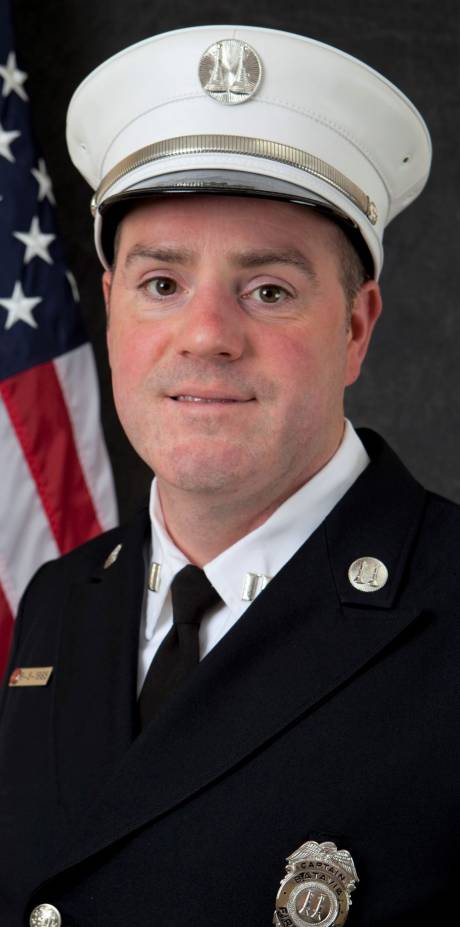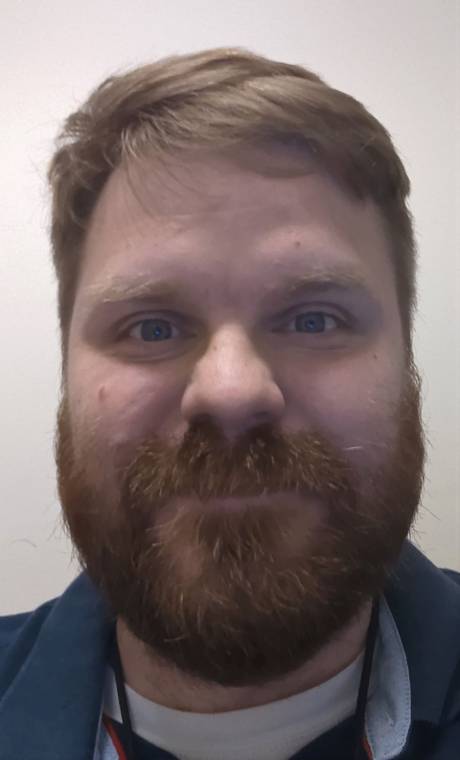
Ireland, speaking at the GOW Opioid Task Force meeting via Zoom earlier this month, said access to a specially-built foyer in front of the fire headquarters on Evans Street for those struggling with substance use has made a big difference – not only for those individuals who are seeking help but also for the fire department personnel assigned to support them.
The Task Force, in conjunction with the Greater Rochester Health Foundation and Genesee/Orleans Council on Alcoholism and Substance Abuse, hosted a public event at the fire station this summer to welcome the City of Batavia FD into the fold – joining the City of Batavia and Village of Le Roy police departments and the Genesee County Sheriff’s Office.
The City of Batavia FD is the first fire department in the state to be a part of the PAARI network.
Ireland (photo at right) said that by educating them about substance use and addiction, firefighters learned to understand what some people are going through.
“There were some in our department who said they didn’t want those people in our building; that they didn’t want to deal with addicts,” he said. “Through education, that was a very easy hurdle to change. Educating our firefighters and employees to the opioid crisis.”
PERCEPTIONS HAVE CHANGED
He also said a key factor in the education process was when a GCASA peer advocate came to the fire department and met with every one of the firefighters.
“That really bridged that gap. They were able to see that these are real people who have real struggles and eventually can be successful,” he said.
Ireland, in thanking the GRHF for a grant that made it possible, pointed to the secure area for PAARI intake at the building’s front door as overcoming another hurdle.
“We were able to build a double-door foyer for intake now, and that’s where the process starts,” he said. “But a firefighter is assigned to stay with that person from the minute they walk in until the peer counselor from GCASA arrives.”
Ireland took on the role as coordinator of the PAARI program for the department after learning the success the Chatham Police Department had in starting several years ago. The initial thought of Chatham organizers was to reduce petty crime by taking those with substance use disorder off the street by getting them help.
“Think about these folks who have that substance use disorder, and they’ll basically take from anything to feed their habit,” he said. “So, what they found is that by eliminating the people with substance use disorder in his community, they reduced the petty crime – theft and things of that nature because people weren’t stealing to buy drugs. That was the whole goal of this program. It reduces crime and there’s some scientific evidence to prove that.”
Ireland said medics use special business cards – printed with “Addiction is not a crime, it’s a disease” and “Help is available 24/7” – when responding to calls involving drug use.
“We will leave the cards on the kitchen table as we leave,” he said. “Our hope is someday maybe they will pick that up, see it and maybe it’s the right time for them to accept the help.”
NON-ARREST PATHWAYS TO TREATMENT
PAARI’s mission is to provide training, guidance, support, and resources to help law enforcement agencies nationwide create non-arrest pathways to treatment and recovery.
It was founded by the Gloucester (Mass.) Police Department along with the Angel Program in June 2015 – creating a simple, stigma-free entry point to treatment and reframing addiction as a disease.
Under this program, those struggling with substance use can go to the law enforcement agency 24/7 and receive help, stigma-free, GOW Opioid Task Force Coordinator Christen Ferraro said.
“What that means is that an officer will meet them at the door and they will help them to get the help that they need,” she said. “If they have drugs on them, police or fire officials will dispose of those drugs for them, they will connect them with the resources for treatment and recovery, and kind of be that first entry point to getting help.”
One of those resources is the support of a GCASA peer support advocate – a team player, often in recovery, who steps into the role of providing a bridge between providers and clients that facilitates the medical and psychosocial care of the client.
Rob Shields, who spoke during the meeting, is one of those people.
MAKING CONNECTIONS IS THE KEY
“As someone in recovery, I wish that I knew about a program like this due to the fact that I might have not gone through the struggles that I went through,” Shields said before explaining his responsibilities.

He said that those struggling with substance use need someone they can connect with – someone who can relate to their situation.
“A peer advocate or peer support advocate emphasizes their support for the peer they're working with,” he said. “They connect with the peer and fight for what they need. Peer advocates can be found next to peers in court. They help them come up with coping skills and ways to monitor their own progress.”
Shields (photo at right) emphasized that substance dependency can be “a scary place.”
“You get to the point where you don’t know where to turn, and you don’t know who to talk to. You’re in so deep, that nothing else matters in your life,” he explained. “You think that people won’t give you the time of day, but with the PAARI program you have people that are there to support you and connect you to the resources to help you on your road to recovery.”
--------------
Along with the options of going to the agencies mentioned above, other avenues for those seeking help with substance use disorder are the 24/7 telephone hotline -- CARE + CRISIS / WYO CO CRISIS 585-283-5200 / PEER PHONE LINE 585-815-1800 -- and GCASA’s The Recovery Station at 5256 Clinton Street Rd., Batavia.
Disclosure: Mike Pettinella is the publicist for GCASA.
